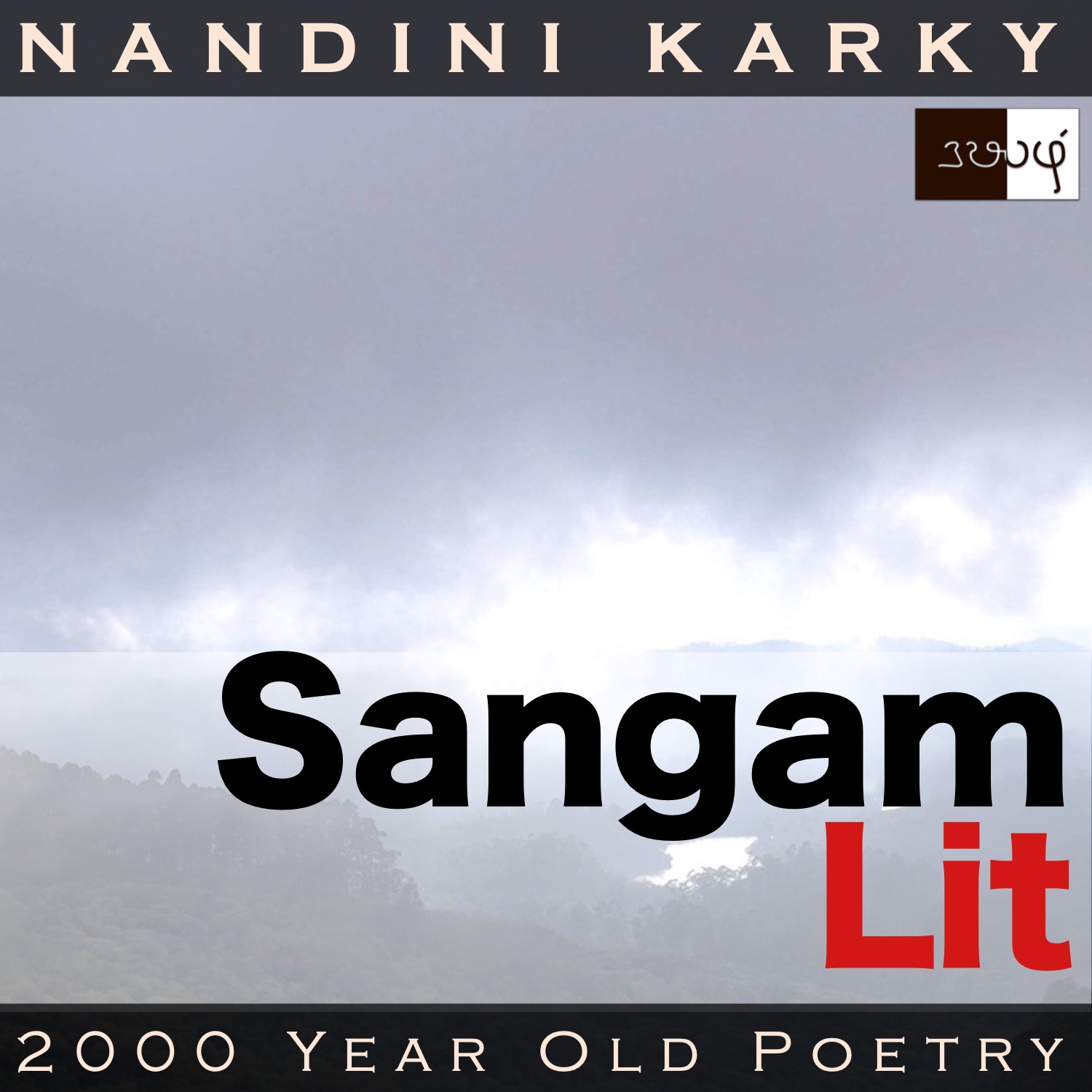Podcast: Play in new window | Download
Subscribe: Apple Podcasts | Spotify | Amazon Music | Android | iHeartRadio | Email | TuneIn | RSS | More

In this episode, we perceive gender differences with regard to life priorities, as portrayed in Sangam Literary work, Natrinai 214, penned by Karuvoor Kosanaar. Set in the ‘Paalai’ landscape, the verse speaks in the voice of the lady to her confidante, conveying the pain of separation, as the man has not returned home in the promised time.
”இசையும் இன்பமும் ஈதலும் மூன்றும்
அசையுநர் இருந்தோர்க்கு அரும் புணர்வு ஈன்ம்” என,
வினைவயின் பிரிந்த வேறுபடு கொள்கை,
”அரும்பு அவிழ் அலரிச் சுரும்பு உண் பல் போது
அணிய வருதும், நின் மணி இருங் கதுப்பு” என,
எஞ்சா வஞ்சினம் நெஞ்சு உணக் கூறி,
மை சூழ் வெற்பின் மலை பல இறந்து,
செய் பொருட்கு அகன்ற செயிர் தீர் காதலர்
கேளார்கொல்லோ-தோழி!-தோள
இலங்கு வளை நெகிழ்த்த கலங்கு அஞர் எள்ளி
நகுவது போல, மின்னி
ஆர்ப்பது போலும் இக் கார்ப் பெயற் குரலே?
The verse opens with a Thirukkural-like pithy couplet, starting with the words ‘இசையும் இன்பமும் ஈதலும்’. Let’s explore that maxim in a moment. The phrase ‘வேறுபடு கொள்கை’ meaning ‘a dissimilar attitude’ highlights a difference in perspective. The alliteratively alluring ‘அரும்பு அவிழ் அலரி’ meaning ‘a full-bloomed, bud-open flower’ delights the senses with its lush imagery. Yet again, we perceive the special status accorded to the dark tresses of a Sangam woman, in the phrase ‘மணி இருங் கதுப்பு’ meaning ‘sapphire-like dark tresses’. ‘செயிர் தீர் காதலர்’ is loaded with much love and respect, for it means ‘faultless lover’ and speaks volumes about the lady’s affection and admiration for the man. The familiar imagery in Sangam verses talking about the effects of parting on a woman is echoed in ‘இலங்கு வளை நெகிழ்த்த’ meaning ‘that which made shining bangles slip away’. The verse ends with the phrase ‘கார்ப் பெயற் குரலே’ meaning ‘the voice of the monsoon cloud’. Let’s listen in to know the meaning echoed herein.
The man and lady had been leading a happy married life when the man feels the urge within to part away in search of wealth. He promises to return before the rainy season starts. The lady is filled with anguish as he parts away. One day, she turns to her confidante and says, “Saying, ‘Fame, happiness and benevolence – these three can never be attained by those who have no impulse to move’, he departed on his mission with a principle different from our own. He did say, ‘I shall come to tie those bee-buzzing, full-bloom flowers on your sapphire-hued tresses soon!’ He left after saying those heartfelt words, brimming with promise, and traversed across many a mountain, clad by clouds, to gain wealth. That impeccable lover of mine, won’t he hear, O friend, the thundering voice of this dark monsoon cloud that shines and roars, appearing as if it’s laughing at my sorrow-filled state that makes bangles from my arms slip away?” With these words, the lady gives expression to her disappointment that the man has not returned in the promised time.
Now, for the tiny details that adorn this verse. The lady starts her outpouring by recollecting the man’s words as he prepares to part away. Those words talked about how the three attributes of fame, happiness and benevolence will not come the way of one who simply stays at home, without initiative. The way these words are styled are so close to the post-Sangam, popular Tamil literature ‘Thirukkural’. Perhaps, ‘Thirukkural-like’ sayings were handed down orally across generations or maybe even available for reading on palmyra leaves, in the Sangam period. As if quoting from a book of knowledge, the man expresses why it’s his duty as a man to leave. The final quality interests me immensely because it’s not about one’s own welfare but about the welfare of others. Fame and happiness could be said to be for oneself but benevolence is for society, to give unto others. The thought to put effort and risk one’s comfortable life so as to give to the needy is indeed a laudable sentiment. The lady describes this attitude of the man to seek things outside of his family life as a ‘differing principle’, differing from her own lot. This tells us that the Sangam woman was not expected to seek these things and also, to find all that she needs, within the confines of her house. This was either the reality then or the reality imagined by Sangam poets to satisfy their famous, wealthy, male patrons and coax them into being benevolent towards them.
Returning to the poem, the lady says that although the man went away, propelled by his principle of seeking wealth, he made a promise to her that he would be back soon to tie her hair with fragrant, honey-soaked flowers many. This is again an indicator of how the Sangam woman used to stay away from adorning herself with flowers, when her man was away. Describing the man as one who was faultless, the lady shows her acceptance of gender roles. Indeed, he has gone and had left her in pain and yet, she finds no fault in him even as he stays away beyond the promised time. She points out to the rainclouds and asks wistfully whether the man couldn’t hear the roar of this downpour where he was. To further highlight how she feels, she describes the lightning and thunder as the roaring laughter of the rain cloud at her pitiable state of pining! Here, the poem highlights the classic case of projection, wherein we take feelings within us and project it on those around us, and in this instance, the lady goes one step further and projects that on the rain-bearing clouds up above! It’s her depressed state that makes her see the world so and let us hope that in expressing her inner feelings, she would soon discover the silver ray of hope amidst these dark clouds!




Share your thoughts...